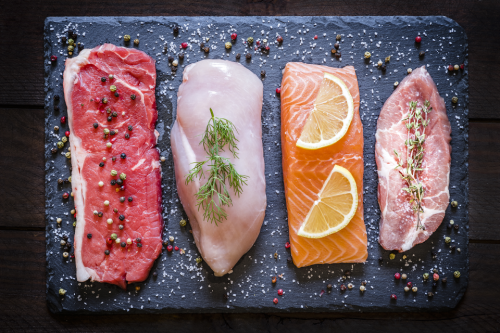Chronic Kidney Disease (CKD) and Protein

How Much Protein Do You Need? Recommendations for Patients with Chronic Kidney Disease
Protein is an important nutrient and has many roles in the body. Protein is essential to build and repair your body’s tissues. It plays a role in metabolism and body function, in addition to helping to keep your immune system strong. Additionally, protein helps to transport and store nutrients and can be used as a source of energy.
Dietary Protein Sources
Dietary protein comes from both animal and plant sources. Animal sources include meat, poultry, fish, seafood, eggs and dairy. Plant-based sources of protein include beans, nuts, seeds, vegetables and whole grains. Read our “Benefits of Plant-Based Eating in Kidney Disease, Part 1” post for more information on the benefits of plant-based eating.
Protein and Chronic Kidney Disease (CKD)
The Recommended Dietary Allowance (RDA) for protein in healthy adults is 0.8 grams of protein per kilogram of body weight. The RDA is the amount of a nutrient you need to meet your basic nutritional requirements. When you have CKD without dialysis, the ability to remove protein waste from the body may decrease and this waste starts to build up. When this waste builds up in the body, it can lead to taste changes, nausea, loss of appetite and weakness. Decreasing the amount of protein in your diet can help to decrease the workload on the kidney and contribute to less protein waste buildup in the body.
Current Recommendations for Protein in Chronic Kidney Disease
The National Kidney Foundation’s Kidney Disease Outcomes Quality Initiative (KDOQI) provides evidence-based guidelines for nutrition in kidney diseases. The updated clinical practice guidelines for nutrition were published in 2020 and they include guidelines for people with end-stage kidney disease, CKD stages 1-5 and functional kidney transplants.
The current recommendations for protein intake for patients with CKD are
CKD Stages 3-5
- Dietary protein restriction providing 0.55 to 0.6 grams of dietary protein per kilogram of body weight per day,
- Or a very low protein diet providing 0.28 to 0.43 grams of protein per kilogram of body weight per day in addition to amino acid supplements called alpha-keto analogues . These supplements help meet the protein requirements of 0.55 to 0.6 grams of protein per kilogram of body weight per day
- Close clinical supervision
CKD Stages 3-5 with Diabetes
- Dietary protein restriction of 0.6 to 0.8 grams of protein per kilogram of body weight per day to maintain stable nutritional status and optimize blood glucose control
- Close clinical supervision
How Much Protein is Right for You?
The amount of protein you need depends on many factors including body size, activity level and other health issues. A registered dietitian who specializes in patients with CKD, or a renal dietitian, can provide you with a complete nutrition assessment and help you determine your individual needs. The CKD Kidney Dietitian Directory is a great place to find a renal dietitian. Medicare covers visits to a Registered Dietitian for patients with CKD stages 3-5 at 100%. All you need is a referral from your doctor. Most commercial insurance plans also offer coverage for this service.
References:
- Ikizler, T. A., Burrowes, J. D., Byham-Gray, L. D., Campbell, K. L., Carrero, J. J., Chan, W., Fouque, D., Friedman, A. N., Ghaddar, S., Goldstein-Fuchs, D. J., Kaysen, G. A., Kopple, J. D., Teta, D., Yee-Moon Wang, A., & Cuppari, L. (2020). KDOQI Clinical Practice Guideline for Nutrition in CKD: 2020 Update. American Journal of Kidney Diseases, 76(3), S1-S107. https://doi.org/10.1053/j.ajkd.2020.05.006 – Accessed October 5, 2021
Additional Kidney Diet Resources
Visit DaVita.com and explore these diet and nutrition resources:
DaVita Kidney-Friendly Recipes
This article is for informational purposes only and is not a substitute for medical advice or treatment. Consult your physician and dietitian regarding your specific diagnosis, treatment, diet and health questions.

Recent Comments